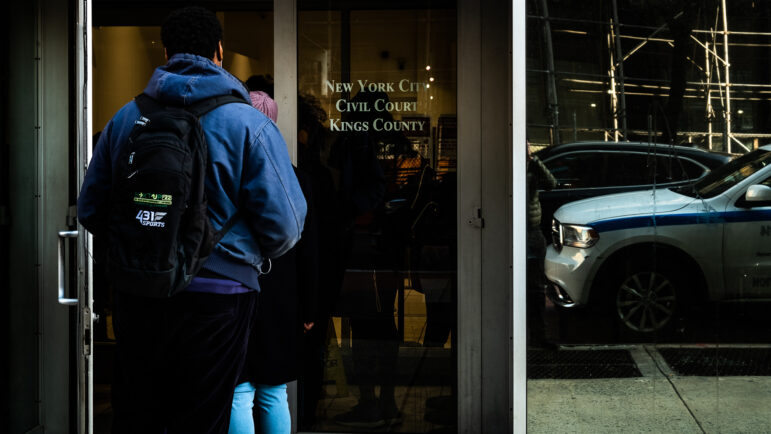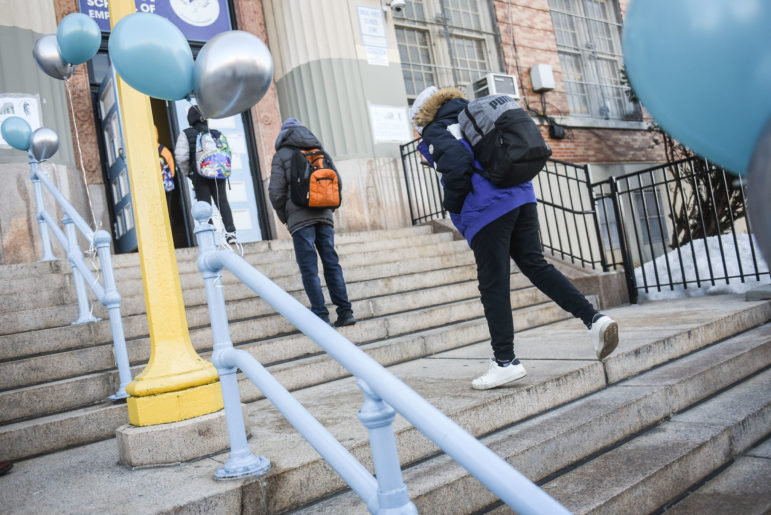Lawyers who represent tenants facing eviction in housing court are poised to see millions of dollars in new funding in the coming year, yet far less than the roughly $350 million boost they’ve said is needed for the Right to Counsel program to live up to its name.

Adi Talwar
People entering Brooklyn Housing Court at 141 Livingston St. on the morning of March 20, 2023.Lawyers who represent tenants facing eviction in housing court are poised to see millions of dollars in new funding in the coming year, yet far less than the roughly $350 million boost they’ve said is needed for the Right to Counsel program to live up to its name.
New York City’s roughly $107 billion budget for the year starting July 1 includes $40.6 million in new funding for legal services providers, $20 million of which will go to legal assistance in housing court, according to a spokesperson for Mayor Eric Adams. The other $20.6 million will go to public defenders in criminal court.
It was not immediately clear how much of the new funding would go to eviction defense for low-income tenants, as City Hall groups this with broader legal support in housing court. Awaiting clarity, advocates nevertheless deemed the funding inadequate, and urged the courts to slow dockets to protect tenants from facing eviction without lawyers.
“It’s clear that now more than ever we need the courts to step in to uphold Right to Counsel,” said Susanna Blankley, coordinator with the Right to Counsel Coalition, made up of tenants and allies who pushed for the program’s creation.
The level of legal services funding shifted following Thursday’s ceremonial handshake between Mayor Adams and Council Speaker Adrienne Adams on this year’s budget plan, City Hall said Friday. Voting kicked off Friday afternoon.
The deal also baselines $30.6 million in legal services funding, including $20 million for housing court matters, to maintain this year’s boost into the future.
New York City’s Right to Counsel program, established in 2017 and billed as the first in the nation to provide “universal access” to eviction defense for those eligible, has struggled this year to keep up with demand, prompting calls to both slow down the speed of eviction cases and increase city funding in order to add staff.
The program is currently funded at about $112 million, according to a City Limits review of contracts in effect through this month.
The vast majority of low-income tenants who receive pro-bono assistance to fight eviction are able to stay in their homes. However, Right to Counsel has never been funded with the expectation of covering every eligible tenant. The pandemic, which accelerated its citywide expansion, brought this reality to the forefront.
This year has also seen a significant increase in eviction filings compared to 2022 in all five boroughs, though filings have yet to surpass 2019 levels. According to a tracker maintained by the Right to Counsel Coalition, fewer than half of tenants sued for eviction between mid-January 2022 and mid-March 2023 have had legal representation as of this month, excluding tenants who have had fewer than two court appearances.
“Deeper investment in Right to Counsel would have ultimately saved the city money and avoided violent, disruptive evictions for thousands of families,” Brooklyn Councilmember Lincoln Restler told City Limits Friday morning.
Under current Right to Counsel contracts, civil legal service providers are expected to represent about 35,000 households per year. Attorneys have predicted that an additional $350 million would help boost salaries for existing attorneys as well as allow the program to hire up and represent about twice as many households.
Earlier in the spring, the City Council called for an additional $195 million for civil and criminal public interest lawyers, with a tentative demand of $70 million for Right to Counsel.
But those numbers were unlikely during a budget season in which Mayor Adams urged fiscal restraint, pointing to the recent influx of asylum seekers putting a strain on city resources. Councilmember Shaun Abreu, a former tenant lawyer himself, told City Limits Thursday that he still considered the funds secured this week a win.
“This council is going to continue to make enhancements a priority, but given how difficult this budget cycle was, I consider this a very huge win,” he said.
Speaker Adams elaborated on the challenges in remarks Thursday, describing tension over proposed cuts. “These negotiations were not easy, and in fact they were uniquely challenging, because of how much it focused on restoring cuts to so many important programs,” she said.
For example, the final budget restores $36 million in cuts to public libraries, which had been put forward in the mayor’s budget proposal and met with strong public opposition.
For his part, Mayor Adams described the agreed-upon budget as “strong and fiscally responsible” Thursday, adding that “government must be more efficient, and use our limited resources wisely.”
The Right to Counsel program could also see new funding from the state in the coming year. The state budget finalized in May includes $10 million for eviction defense in New York City, the governor’s office confirmed at the time.
Back at the city level, the council has discretion to send so-called Schedule C funds to nonprofits and community groups, starting with at least $400,000 per member. This year’s breakdown was released Friday, and includes numerous smaller-scale investments in eviction defense work, including legal assistance.
The Schedule C document also includes $3.45 million for “Legal Services for the Working Poor,” some of which will go toward eviction defense, in addition to broader housing-related matters, immigration and domestic violence representation.
Rosalind Black is citywide housing director at Legal Services NYC which, along with the Legal Aid Society, receives Right to Counsel’s largest contracts. She described this year’s city budget boost as a down payment, and not nearly enough to expand the universe of represented tenants.
“I’d say in a difficult funding year it’s clear that the council fought very hard to get what is a down payment for what we need to be able to effectively represent tenants in New York City who are at risk of eviction,” she said.
“Once we have more certainty around the numbers we are optimistic that we can add some additional staff,” Black added. “But it’s still not sufficient to allow us to hire the staff and retain them in the way we need to.”








